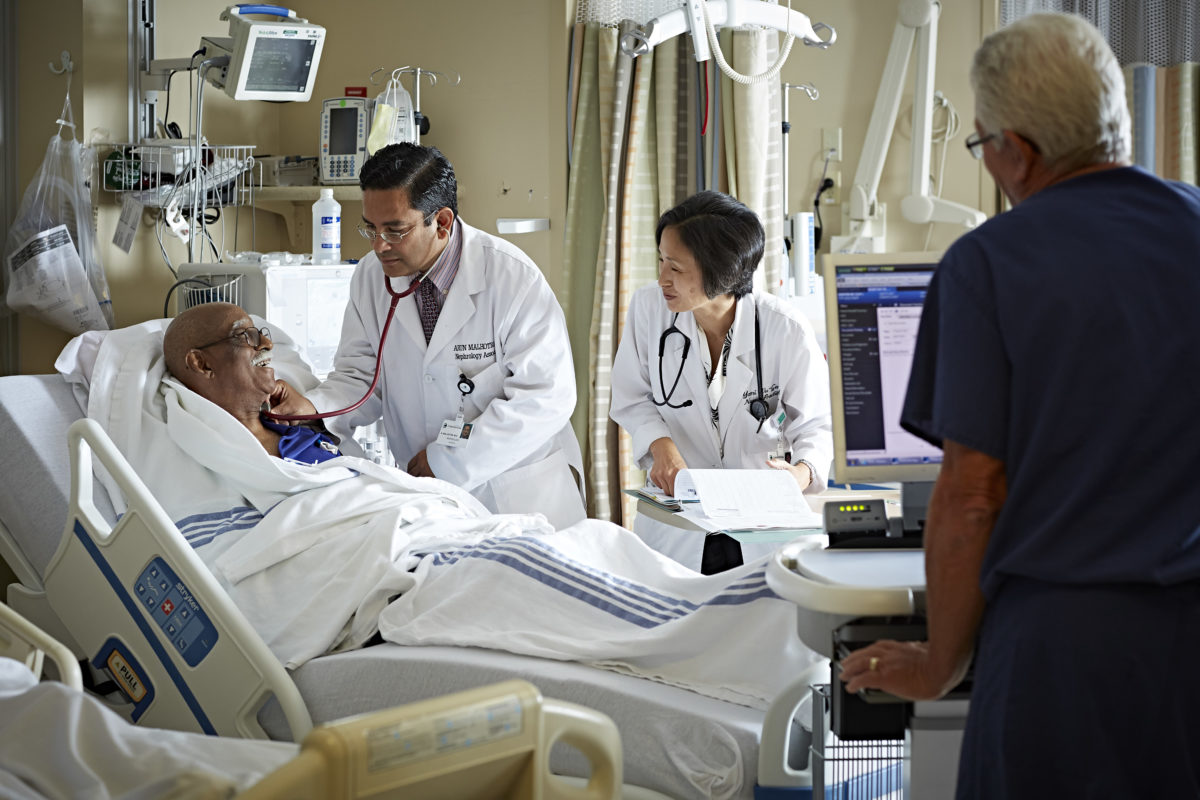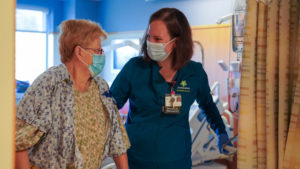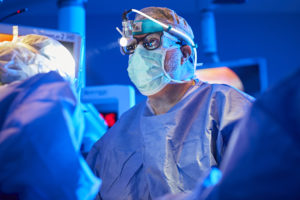Christiana Care Health System has been recognized for excellence as the best hospital in Delaware and No. 3 among the 96 hospitals in the entire Philadelphia region by U.S. News & World Report.
Moreover, Christiana Care was named among the top 50 in the nation in four specialties: Nephrology, Pulmonology, Diabetes & Endocrinology, and Gastroenterology & Gastrointestinal Surgery.
U.S. News and World Report also ranked Christiana Care as a high-performing hospital in the specialties of Geriatrics, Gynecology, Urology, Orthopaedics and Neurology & Neurosurgery.
Christiana Care was one of only 63 hospitals in the nation that earned a high-performing rating in all nine inpatient surgical procedures and chronic conditions that U.S. News evaluated: colon cancer surgery, lung cancer surgery, heart bypass surgery, aortic valve surgery, abdominal aortic aneurysm repair, hip replacement, knee replacement, heart failure and chronic obstructive pulmonary disease.
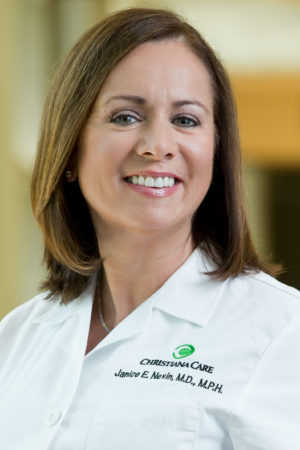
“This honor is a very special recognition that belongs to our exceptional people who each day demonstrate an extraordinary commitment to advancing The Christiana Care Way,” said Janice E. Nevin, M.D., MPH, Christiana Care president and CEO. “This award is further evidence of our progress in helping our communities achieve optimal health and an exceptional experience through the value-driven care we provide.”
A key mechanism of that improvement has been the implementation of a service line structure that has united clinical teams from across Christiana Care, standardizing care through the development of clinical pathways that address specific conditions or diseases.
“It starts by articulating our values in many ways, over and over again. The patient is at the center of everything that we do,” said Virginia Collier, M.D., MACP, physician leader of the Acute Medicine Service Line and chair of the Department of Medicine, which includes Nephrology, Pulmonology, Diabetes & Endocrinology and Gastroenterology. “The service line structure has allowed all of the clinical teams and leaders to really pull in the same direction.”
Proactive pulmonary care
Over the last few years, Christiana Care’s pulmonologists, now part of the Acute Medicine Service Line, have focused on improving care for patients with chronic obstructive pulmonary disease, or COPD, the fourth-most-common diagnosis at Christiana Care. The Best Hospitals study ranked Christiana Care’s pulmonology care at 45th nationwide.
The multidisciplinary COPD team includes a case manager who screens patients for exacerbating factors, allowing the team to craft proactive care rather than simply react to ailments as they arise.
The case manager also addresses common challenges to treatment, including smoking cessation, medication affordability, post-discharge appointments and the use of pulmonary rehabilitation.
“We know that pulmonary rehab is one of the few things that’s been shown to decrease readmission and improve quality of life,” said Albert A. Rizzo, M.D., FACP, FACCP, chief of Christiana Care’s Pulmonary and Critical Care Medicine Section.
The team has made starting rehabilitation more convenient for patients by providing a therapist to perform an assessment while the patient is still in the hospital, said Vinay Maheshwari, M.D., associate chair and associate physician operations leader of the Acute Medicine Service Line.
“Often, the challenge is getting patients started and in the door the first time,” Dr. Maheshwari said.
In just one year, efforts to standardize COPD care have led to a 7 percentage point drop in the 30-day readmission rate.
The critical care team deserves much of the credit in the treatment of COPD, as many sufferers have serious comorbidities, including heart failure. The report’s methodology, too, puts much of the emphasis on critical care, which at Christiana Care has benefited from a team-based model that includes dedicated medical intensivists and critical care assistants such as physician assistants, ICU nurses, COPD case managers, respiratory therapists, physical therapists and registered dietitians. This model of 24-hour expert care allows for standardization, including twice-daily multidisciplinary rounds — an innovation that sustains treatment progress through the evening and night.
“This has got to be a 24-hour cycle,” Dr. Maheshwari said.
The pulmonary team is also helping to turn the tide on lung cancer in Delaware by partnering with the state’s Screening for Life Program, Dr. Rizzo said. Individuals at risk of lung cancer are referred to a nurse navigator who provides screening education. Scans are read by radiologists trained in low-dose lung cancer screening. The goal: Identify patients with early-stage cancer before they show symptoms, when the disease is most treatable.
Diabetes care recognized
Christiana Care’s Best Hospitals ranking in Diabetes & Endocrinology reached 18th this year, up from 26th last year and 33rd in 2014.
The complexities involved in treating a far-reaching illness such as diabetes make it a useful case study in the benefits of a team approach. It was for this reason that Christiana Care’s Primary Care and Community Medicine Service Line chose Type 2 diabetes as its clinical pathway, a detailed road map that lays out evidence-based methods to treat illness.
One recent innovation involves the training of a diabetes resource nurse who sees every diabetic patient on his or her inpatient unit, said James Lenhard, M.D., section chief of Endocrinology.
This nurse implements evidence-based practices, such as ensuring that patients are able to obtain their medicine and take it as directed. In 2015, Christiana Care presented research at the American Diabetes Association that showed that patients on inpatient units with diabetes resource nurses had reduced lengths of stay and decreased readmissions, compared with patients on similar units without such nurses.
Improving diabetes care has meant breaking down a host of processes to the granular level, said Omar Khan, M.D., MHS, FAAFP, physician leader for the Primary Care & Community Medicine Service Line. For example, the team identified a need to focus on ensuring that patients arrive at their doctor’s appointment with a key piece of data that can help to guide treatment decisions — a measure of diabetes control called hemoglobin A1C.
“It sounds simple,” Dr. Khan said, “but we needed to focus on the details while remaining attentive to the big picture.”
Kidney treatment relies on hospital partnership
Christiana Care’s nephrology care was ranked 42nd nationwide. Patients who receive dialysis at Christiana Care receive a high level of support, said Theodore F. Saad, M.D., chief of the Section of Nephrology.
“It’s essential that patients and physicians have confidence that there’s a high-quality institution to give the patient the best possible outcomes,” Dr. Saad said. “That’s something that Christiana Care has been paying a lot of attention to.”
Lindsey Slater, M.D., medical director of the Christiana Hospital dialysis unit, said the kidney transplant program has thrived through this cooperation.
“By working with surgeons we know personally, there is much better communication and management of the patient,” she said.
Arun V. Malhotra, M.D., medical director of the hemodialysis unit at Wilmington Hospital, said he has been impressed by Christiana Care’s commitment to collaboration, including staff support. “Being here has helped us raise the bar,” he said. Moreover, Christiana Care’s size has itself paid dividends, as the experience gained from a high volume of patients has enabled the team to fine-tune the complex care for patients with kidney failure.
The team’s proximity to Wilmington Hospital’s Emergency Department also allows it to quickly respond with the emergency team in evaluating and treating patients, he said.
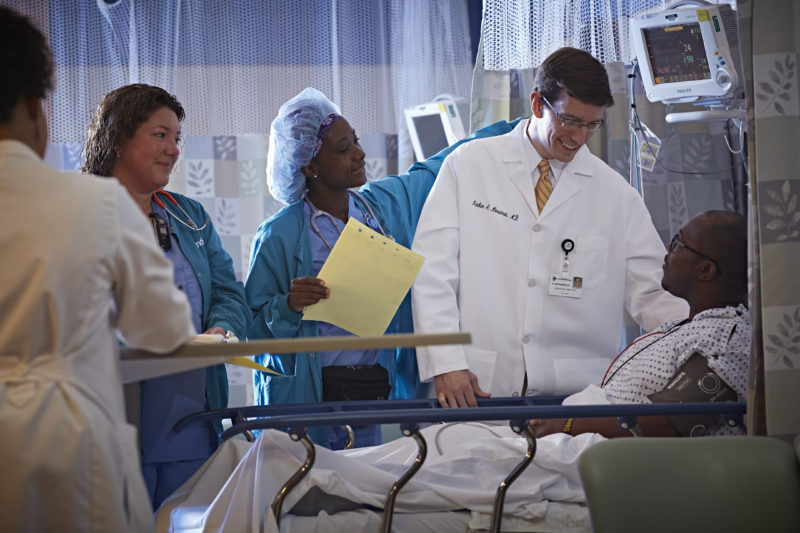
Gastroenterology and GI Surgery continue to excel
Innovation in gastroenterology, ranked 45th in the Best Hospitals report, has been driven by efforts to build a culture of collaboration, said Nathan A. Merriman, M.D, MSCE, section co-chief of Gastroenterology, with Jared Hossack, M.D., MBA. To that end, Dr. Merriman has helped to create the Endoscopy Performance and Value Improvement Team, a multidisciplinary leadership group that discusses patient cases and general care processes.
“The endoscopy suite serves as a bridge in the continuum of care for patients,” Dr. Merriman said, noting that the images and endoscopy reports recorded are very helpful to the surgeons.
Gerard J. Fulda, M.D., FACS, chair of the Department of Surgery and physician leader for the Surgical Services Service Line — which includes Gastrointestinal Surgery and the Kidney Transplant Program that helped strengthen Christiana Care’s high ranking in the specialty of nephrology — said surgeons are increasingly looking at the patient experience before and after the operation. Christiana Care surgeons use screening tools to prepare high-risk patients in order to decrease complications, while hospitalists track patients after surgery.
“We’re trying to provide optimal care for a particular individual as opposed to treating everybody the same way, and the service line structure has been driving all of these improvements,” Dr. Fulda said. “Instead of it being one or two things, we’ve built a pathway of expectations, and everyone is educated on that pathway — including the patient, who gets a consistent message and knows what to expect.”
Dr. Fulda said that Christiana Care also has spearheaded the use of surgical robotics to remove cancers of the lower colon. Robotic surgery can enhance the surgeon’s ability to access and see inside the body, while allowing smaller incisions and often resulting in less pain, less blood loss and less time in the hospital for patients.
Another surgical initiative has been organized around limiting blood transfusions, since the overuse of transfusions can harm patients’ immune systems and make them more vulnerable to infections.
Goals of these efforts include decreasing complication rates, reducing lengths of stay and improving patient satisfaction, while using less health care resources, Dr. Fulda said.
Benefits across the health system
A growing culture of collaboration throughout Christiana Care Health System is helping to improve quality and patient safety across the board. The continued implementation of the service line model, put in place only last year, is expected to reap further benefits.
A key area of focus is reduction in preventable harm to patients, such as falls or hospital-acquired infections. Christiana Care’s systemwide tracking of these and other metrics help to ensure the safety of all patients.
As Dr. Collier described the system’s harm-reduction efforts, “We’ve been successful every year and we are going to continue to be successful until the harm goes to zero.”
